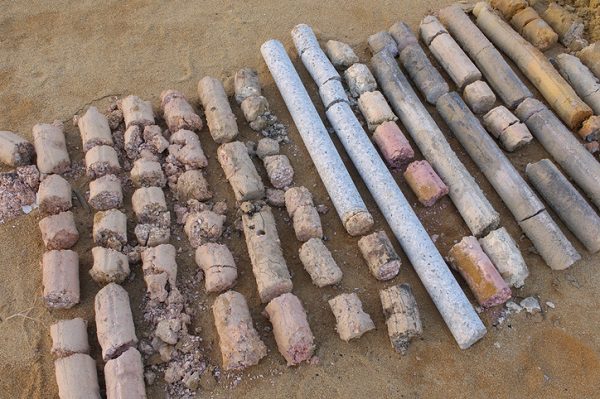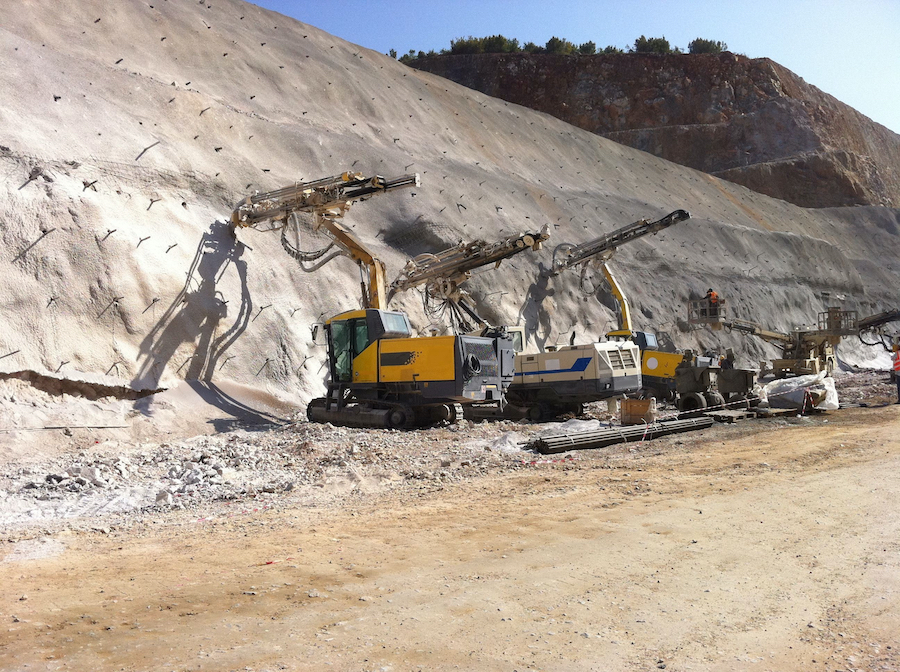The Value of Geotechnical Engineering in Dealing With Environmental Obstacles and Enhancing Construction Security
Geotechnical design functions as a keystone in the crossway of ecological stewardship and building security, providing crucial insights right into the actions of dirt and rock under different problems. This discipline not only addresses pressing ecological difficulties such as dirt erosion and groundwater protection yet likewise improves the effectiveness of infrastructure against natural dangers. By implementing tactical site examinations and tailored mitigation actions, geotechnical designers play a vital function in protecting both human lives and eco-friendly stability. The intricacies of these difficulties elevate vital questions concerning the future instructions of this field and its implications for sustainable growth.

Duty of Geotechnical Design
Geotechnical design plays a vital role in the design and building of infrastructure by dealing with the actions of dirt and rock materials under various problems. This area of engineering is essential for comprehending the interaction between frameworks and the ground, that includes figuring out the load-bearing ability of dirt, examining stability, and forecasting prospective negotiation or failure.
Geotechnical engineers are responsible for performing site investigations, which involve tasting and screening soil and rock to collect data on their chemical and physical residential or commercial properties. This info is essential for developing foundations, keeping wall surfaces, and various other earth-retaining frameworks that make certain safety and security and durability. In addition, geotechnical design informs the choice of proper building and construction techniques and products, consequently reducing risks related to dirt actions.
In addition, the assimilation of geotechnical design concepts right into urban preparation and ecological management is vital for addressing obstacles such as ground contamination and groundwater administration. By understanding geotechnical aspects, engineers can establish lasting services that enhance the durability of facilities against all-natural risks, while likewise advertising ecological stewardship. Ultimately, the function of geotechnical design is crucial for achieving risk-free, sturdy, and ecologically aware construction techniques.
Soil Erosion Reduction
Soil erosion presents a significant hazard to both ecological stability and framework integrity, impacting roughly 24 billion lots of abundant dirt lost annually worldwide. This phenomenon is exacerbated by factors such as deforestation, urbanization, and inadequate agricultural techniques. Geotechnical design plays a crucial role in establishing effective dirt disintegration reduction methods that secure both the environment and building tasks.
One approach requires the implementation of disintegration control techniques such as plant life growing, which supports soil with origin systems. Additionally, the construction of keeping terraces and wall surfaces can effectively lower surface overflow and safeguard at risk areas from disintegration. Appropriate water drainage layout is likewise important; it minimizes water buildup and routes excess drainage far from crucial frameworks.
Moreover, geotechnical designers employ soil stablizing techniques, such as the application of geotextiles and biodegradable floor coverings, to improve dirt cohesion and avoid degradation - geotechnical engineer description. Normal tracking and analysis of erosion-prone sites enable timely treatments, making sure long-lasting sustainability. By integrating these methods, geotechnical design not just minimizes the impacts of soil erosion but also adds to the durability of framework against environmental obstacles, inevitably promoting a safer and extra sustainable constructed environment
Groundwater Protection Approaches
Groundwater functions as an important resource for drinking water, agriculture, and industrial procedures, making its protection crucial for environmental sustainability and public wellness. Effective groundwater security approaches are crucial in reducing contamination risks and making sure the longevity of this resource.

Routine surveillance of groundwater high quality is likewise crucial, making it possible for early detection of contamination resources and assisting in timely removal initiatives. Utilizing innovative innovations, such as geophysical surveys and remote sensing, help in recognizing potential dangers to groundwater books.
Additionally, public education and learning and stakeholder interaction are critical, cultivating neighborhood assistance for groundwater protection initiatives. geotechnical companies in south africa. By incorporating regulatory procedures, technological innovations, and area involvement, we can develop a detailed structure that safeguards groundwater sources while advertising sustainable advancement and construction practices
Landslide Risk Monitoring
Landslides position significant threats to both human security and infrastructure, making efficient danger management approaches essential. Geotechnical engineering plays a vital duty in recognizing, evaluating, and mitigating landslide dangers. A comprehensive understanding of slope security, dirt auto mechanics, and hydrology is important for developing reliable danger monitoring plans.
The initial action in landslide danger administration involves extensive website investigations, that include geological mapping and soil screening. These examinations aid engineers assess the capacity for landslides by identifying crucial aspects this page such as incline angles, soil composition, and water web content. Making use of sophisticated innovations such as remote picking up and geophysical surveys can improve the accuracy of these evaluations.
When dangers are identified, ideal mitigation steps can be carried out. These might consist of design options such as preserving wall surfaces, water drainage systems, and slope stabilization methods. Keeping track of systems should be developed to spot signs of ground movement and adjustments continue reading this in water degrees, permitting for aggressive interventions.

Enhancing Building Safety
Building websites often present a myriad of threats that can threaten employee safety and task honesty. Geotechnical engineering plays an important function in improving building safety and security by providing vital insights right into subsurface conditions. Through extensive soil and rock analysis, geotechnical designers can identify potential threats, such as soil instability, groundwater problems, and seismic susceptabilities, which might jeopardize the safety of building and construction activities.
Implementing geotechnical options, such as appropriate structure style and the use of retaining structures, alleviates these dangers considerably. These remedies not just ensure the security of the structures being built yet additionally develop a more secure working setting for construction workers.
In addition, promoting a culture of safety and security via training and adherence to developed security methods further boosts construction website security. By integrating geotechnical expertise right into the preparation and execution stages, building tasks can achieve higher security criteria, inevitably safeguarding employees and guaranteeing effective job completion.
Final Thought
In conclusion, geotechnical engineering offers as a vital technique in taking on ecological difficulties and promoting construction safety and security. Through reliable dirt disintegration mitigation, groundwater defense methods, and landslide risk management, geotechnical engineers contribute to the growth of durable facilities.
Geotechnical engineering serves as a foundation in the intersection of ecological stewardship and building and construction safety, giving essential understandings right into the habits of dirt and useful site rock under numerous problems. Geotechnical design educates the option of appropriate building techniques and materials, therefore decreasing dangers connected with soil habits.
Geotechnical engineering plays a critical function in creating reliable dirt disintegration mitigation strategies that protect both the setting and building and construction jobs.
Additionally, geotechnical engineers employ soil stablizing strategies, such as the application of geotextiles and naturally degradable floor coverings, to improve soil cohesion and avoid deterioration. With comprehensive dirt and rock analysis, geotechnical designers can identify possible dangers, such as soil instability, groundwater issues, and seismic susceptabilities, which may jeopardize the safety of building tasks.